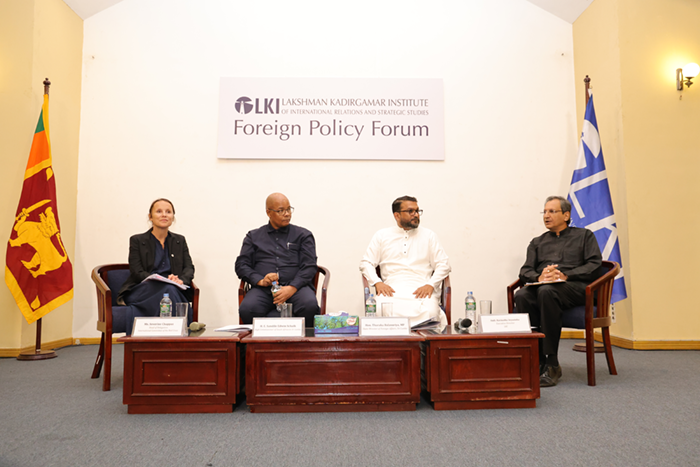NEWS
SA envoy to Sri Lanka lambastes Israel

From left: Ms. Severine Chappaz, Sandile Edwin Schalk, Tharaka Balasuriya and Ravinatha Aryasinha
South African High Commissioner to Sri Lanka, Sandile Edwin Schalk, flayed Israel over war crimes perpetrated during the ongoing offensive against Hamas, launched after the Oct 7 assault carried out by the group.
The SA envoy questioned the failure on the part of the UN to intervene unjustifiable Israeli actions. He said so at the second LKI Foreign Policy Forum, titled “Israel-Palestine Conflict and Its Ramifications: Global Perspectives,” at the Lighthouse Auditorium of the Lakshman Kadirgamar Institute of International Relations and Strategic Studies.
Executive Director of the LKI, Amb. Ravinatha Aryasinha, who hosted the session, outlined the context to the ongoing Israel-Palestine conflict. The former Foreign Secretary described the timeline of recent hostilities since the attack by the Hamas on October 7th and taking of hostages, and the retaliatory action taken by the Israeli security forces that has continued since.
The South African HC expressed his deep concern regarding the failure of multilateral organisations to uphold international humanitarian law. He continued; ‘Apartheid was a system that normalised criminal behaviour, and criminalised normal behaviour’, in reference to his own country’s experience under white led Apartheid rule, and drew parallels to the systematic oppression of Palestinians in Gaza.
Describing Israel’s illegal occupation of Gaza and the unjustifiable war crimes committed by Israel, he asked “does any occupying force, have a right to defend?” Emphasizing the importance of an immediate ceasefire, High Commissioner Schalk was also critical of “those who won’t vote in support of a ceasefire and humanitarian corridors”.
The High Commissioner also emphasised the flaws in the United Nations architecture, which has failed to adapt to the changing global demographics and over-represents the historically influential states that created it. He outlined the failure of multilateral organisations to uphold international humanitarian law due to power politics and skewed power structures, which the Global South has begun to disrupt through more pragmatic and cohesive approaches to international relations. The High Commissioner also acknowledged the formation of alliances based on military might, which presents new challenges to the global order and has dangerous implications for global security. He said the Global South has an important responsibility to contain and curtail these tendencies.
Held on a quarterly basis, LKI’s Foreign Policy Forum brings together experts with diverse perspectives to discuss contemporary foreign policy issues and their implications for Sri Lanka and the region.
Opening the discussion, State Minister of Foreign Affairs Tharaka Balasuriya shared both the perspectives of the Government of Sri Lanka and the people of Sri Lanka.
Participating in the discussion, the Head of Delegation for the International Committee of the Red Cross in Sri Lanka Ms. Severine Chappaz, provided the humanitarian context in Gaza and described the challenges faced by organisations on the ground as they support civilians affected by the conflict. She emphasised that international humanitarian law is the most complete and practical tool to ensure the protection of civilians and that it must be upheld to pave the way for the de-escalation of the conflict. Ms. Chappaz reiterated the ICRC position which calls for the protection of civilians and essential infrastructure, including water security and medical services, the immediate release of hostages, and the free movement of civilians out of the conflict zones.
